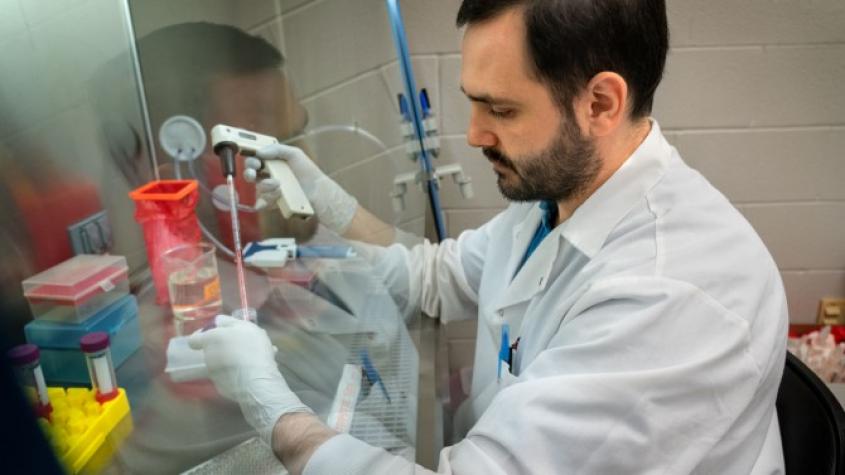Baker Institute COVID-19 Research
Baker Institute COVID-19 Research Currently Underway
The Parrish Lab is carrying out a study on the structure of the COVID-19 spike protein that the virus uses to gain entry to cells. The lab is also investigating the structure of antibodies that may recognize this spike protein and be protective against infection. Dr. Parrish is also working with epidemiological modelers who are collaborating on computer and epidemiological studies aimed at predicting the current and future spread of the virus outbreak in the USA and elsewhere.
The Schang Lab screening a number of broad spectrum antiviral molecules that they have in their collections, plus a number that are being sent by collaborators, against SARS CoV-2. The identification of molecules active and inactive against this virus provides valuable information in the search for novel antivirals; it may also lead to the identification of a chemical scaffold for antiviral development.
The lab has just received a Fast Grant with Dr. Katherine Seley-Radtke and others to test existing and new “fleximer” inhibitors of RNA-dependent RNA polymerases against SARS CoV-2. Several compounds in these series were previously shown active against SARS CoV-1 and MERS and to be well tolerated in mice.
The lab has established a workflow to efficiently perform targeted screens (small to medium scale) to identify inhibitors of SARS CoV-2 and other human coronaviruses. They have secured the required approvals, and are in the process of certifying the first member of the lab to work in the BSL-3 facility, Dr. Rodrigo Dos Santos. Rodrigo has seven years of experience working in the BSL-3 (and BSL-4) facilities in the National Microbiology Laboratory in Galveston, TX, and was certified for BSL-3 work there, before joining Cornell. Dr. Consuelo Correa Sierra, who is an MD/Ph.D. with ample experience and expertise in human diagnostic virology, is working in the BSL-2 with endogenous human coronaviruses and analyzing cell toxicity. She will be trained for BSL-3 work as well as soon as possible.
This week of May 4th, the Schang lab started the first screen against a human endemic coronaviruses (OC43). They are also working in the BSL-3 facility located in the Animal Health Diagnostic Center where they have grown the seed stock of SARS CoV-2 and will be titrating it to then grow the working stocks to start the screenings.
Dr. Schang has more than two decades of experience on identifying and characterizing small molecules with broad spectrum antiviral activities, precisely because of the critical roles that such antivirals can play against a new pandemic virus. They typically test selected molecules for their activity against a wide-spectrum of unrelated viruses that cause disease in human or animals. At this time, however, the Schang lab has ceased all work with all other viruses to fully focus on SARS CoV-2, as required by the urgency of the situation. To perform this work in the most efficient manner, the team includes Dr. Rodrigo Dos Santos, who has ample experience with emerging viruses and is trained to work in BSL3 and BSL4, and Dr. Consuelo Correa-Sierra, an MD/Ph.D. with ample experience in human virology.
In addition, the Cornell Atkinson Center for Sustainability has awarded seven Academic Venture Fund (AVF) interdisciplinary seed grants, totaling $1.1 million, for projects that engage faculty from eight Cornell colleges and 16 academic departments - including the College of Veterinary Medicine and the Schang lab at the Baker Institute for Animal Health for this project: Reducing Health Care Workers’ Risk From Disease Spread: Researchers will develop, monitor and model mitigation strategies for medical facilities to protect the safety of health care workers from COVID-19 in New York City.
Researchers: Max Zhang, mechanical and aerospace engineering; Nathaniel Hupert, Weill Cornell Medicine; Luis Schang, Baker Institute for Animal Health; and Todd Cowen, civil and environmental engineering.
Diel Lab will focus on the development of novel diagnostic assays and reagents with potential immunotherapeutic applications against SARS-CoV-2. The lab will leverage platforms developed for other animal coronaviruses to help in the fight against COVID-19. Dr. Diel is also working on diagnostic capabilities at the Animal Health Diagnostic Center, should animal testing be needed in the future.
Recent News
 CVM COVID-19 working group gears up
CVM COVID-19 working group gears up
|
Did a Mutation Turbocharge the Coronavirus? Not Likely, Scientists Say, The New York Times, “They got a bit over their skis on title, conclusions,” wrote Brian Wasik, an evolutionary biologist at Cornell University. “They deserve a strong and good-faith peer review.” |
|
Beware Overblown Claims of Dangerous Coronavirus Strains , The Atlantic, “We have evidence for one strain,” says Brian Wasik at Cornell University. |
More NEWS



